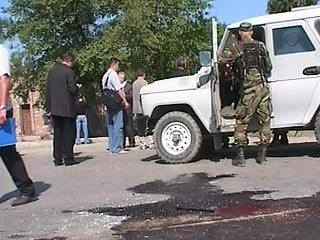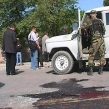
Suicide Bomber Targets Interior Ministry in Grozny
Publication: North Caucasus Weekly Volume: 10 Issue: 19
By:

A bomb blast near the headquarters of Chechnya’s Interior Ministry in Grozny on May 15 reportedly killed two policemen and wounded at least five other people, including civilians. According to Itar-Tass, the explosive device was detonated by a suicide bomber at a police checkpoint located 300 meters from the Interior Ministry building around 11 a.m., local time. The suicide bomber was reportedly an elderly man who was allowed to get close to the building because of his age. After arriving at the scene in a car, he reportedly detonated the device after unsuccessfully trying to get into the Interior Ministry building without the proper authorization papers.
Interfax quoted an Interior Ministry source as saying that two unknown individuals had tried to cross a security post in front of the building, Agence France-Presse reported. “The police prevented them from doing so,” the source said. “At that moment one of the criminals went up to the policeman, put his arms round him, and then blew himself up. Two police were killed and several others have been wounded.”
Some Russian news sources reported on May 15 that two suicide bombers were involved in the incident.
A bomb blast near the village of Belgatoi in southern Chechnya on May 12 killed two police officers and wounded a local resident. Interfax reported that an improvised explosive device detonated as a car owned by a policeman from Grozny’s Staropromyslovsky district was driving along a road near Belgatoi. The explosion killed the policeman and his two passengers – a Chechen Interior Ministry officer and an unemployed resident of the Grozny district village of Pobedinskoe.
Vremya Novostei on May 8 quoted anonymous federal law enforcement sources as saying that on the heels of the recent announcement that formally ended the counter-terrorist operation in Chechnya (North Caucasus Weekly, May 1 and 8, April 17 and 24), the federal authorities, while going forward with plans to halve the number of forces in the republic, will use a new body for coordinating security in the region as an instrument to tighten control over security forces loyal to Chechen President Ramzan Kadyrov.
According to the paper, the new committee that is set up to coordinate the work of Chechen security forces will be under the command either of the federal Interior Ministry’s Internal Troops or the Kremlin’s Security Council, which is currently headed by Nikolai Patrushev, the former Federal Security Service (FSB) director. This committee, wrote Vremya Novostei, “will most likely receive the right to operationally interfere in the work of the Chechen law enforcement structures and will be obligated to take over the leadership of the forces if there is a worsening of the situation.” In addition, according to the newspaper, around 22,000-23,000 federal servicemen will remain in Chechnya.
Meanwhile, Kavkazky Uzel on May 14 quoted an unnamed staffer with the Council of Non-Governmental Organizations of Chechnya as saying that Chechen policemen who are trying to leave the force are being prevented from doing so by their superiors, who are refusing to sign off on their resignations, and that they even risk being beaten. “We have received information that staffers of a number of units of the republican MVD who, since the cancellation of the counter-terrorist operation regime in Chechnya, have wanted to quit in connection with the fact that they are not happy about their current salaries, are not able to do so,” the staffer told the website. “In the special-purpose regiment of the Chechen MVD there was even a case in which commanders beat one of the servicemen in front of the ranks. This happened after the policeman said that he would quit even if his resignation papers weren’t signed.”
The NGO staffer said that while a year ago people seeking work in the Chechen police had to pay bribes of $3,000-$4,000 or more to be considered, the opposite is now the case: policemen have to pay that amount if they want to leave the service.




